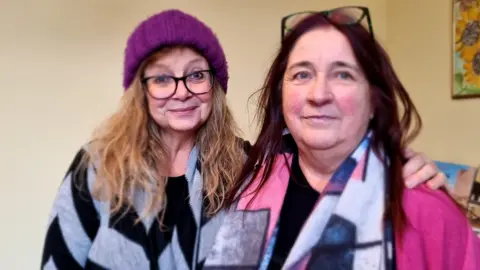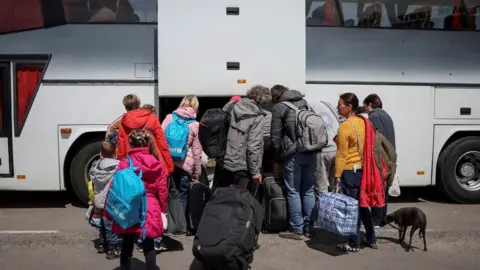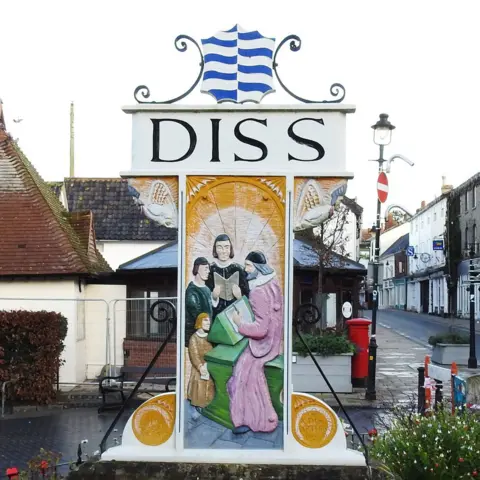Hosting Ukrainian refugees can be challenging - Diss hosts
 Paul Moseley/BBC
Paul Moseley/BBCBritish people who have hosted Ukrainians fleeing the Russian invasion have described the experience as positive, but also challenging.
Since March, some 75,000 people have sought refuge in the UK, with 279 of them settling in south Norfolk.
The host scheme has seen sponsors take in refugees for at least six months.
Two hosts from Diss said those considering taking in families needed their "eyes wide open" about the level of support their guests might require.
In August, a government Office for National Statistics survey of Homes for Ukraine hosts found 26% wanted to end their sponsorship after six months or less.
Cathy Upton-Browning and Sally Rash have been part of a support group for host families and Ukrainians in the small market town of Diss.
"I don't think any of us realised all the things we would have to be there for," said Ms Upton-Browning.
"Carer, transport worker, form-filler. It takes time [as does] navigating the gov.com website - even as an English person it's difficult to navigate."
'Very needy'
She added that simple things like opening a bank account were a challenge, as many Ukrainians had no utility bills to prove their credit-worthiness or help prove who they were.
Ms Rash said many of their guests needed help seeking independent accommodation or jobs.
"It is a 24-hour thing. Our guests were very needy, others we know, less so," she said.
"Some have come over with cars, ours with very little."
The refugees she hosted have now moved into a flat, were working, and hoped to "contribute back".
 Reuters
ReutersMs Upton-Browning said: "I think a lot of us did too much for them [all the refugees] to a point that they stopped doing it for themselves."
Her advice to others considering taking in a family would be to encourage new hosts to help refugees to be more independent.
Her own refugee family "have been great", and she had been involved in every transition.
This included finding out what courses the children could take when moving from school to college and helping with the "endless paperwork".
She does not deny, at times, there were tensions.
"There's always issues. You can have issues when your own family come and stay, but you have an end date," said Ms Upton-Browning.
"The problem with the situation now is that there is no end date.
"If there's an issue or an argument they can't say 'I'm going back home'. You have to resolve it.
"There's cultural difference, there's behavioural difference, on how we expect our children to behave, and what they think are the guidelines."
 Adrian Pye/Geograph
Adrian Pye/GeographMs Upton-Browning added that a lack of public transport in the villages near Diss was "a major issue" in terms of enabling refugees without their own vehicles to take up jobs and to meet up.
"It also leads to isolation, especially those sent to villages such as Scole and Burston outside of the town," she said.
"Those with young families, young children, they suddenly realise they have to walk a mile to school.
"That there is no other person locally that they can just go and have coffee with. It means getting on a bus and then they're restricted to hours [the bus operates]."
Would she host again?
"Knowing what I do, I probably would," said Ms Upton-Browning.
"I'm much more aware of what I had to do and shouldn't do this time."
'Commitment and responsibility'
Her view is shared by Ms Rash, who said: "If I'm honest, one would have to think very carefully, because it does impact on your own lives.
"So yes, I would do it again, but I would have to seriously consider who came to me, a young mum or an older couple.
"You must have your eyes open, you must think carefully.
"Because it is a commitment and a responsibility. And we mustn't lose sight of that."
Both women said the biggest issue though, had been the "not knowing".
"We don't know what we have to do or where to go to next. The authorities can't help you because they don't know either," she said.
South Norfolk councillor Alison Thomas said the council recognised the challenges involved in hosting, especially now, with no signs of the war ending soon.
Part of the council's Homes for Ukraine strategy, she said, "was to work with host families, so that they knew what they were taking on and the commitment involved... to make sure there's no surprises."
"We've been keeping in contact - if the situation is tricky in a host family - we try and find them another host or a rental," she said.
"We haven't had a flood of people needing to be resettled - but I am concerned that this could change in the not too distant future."

Find BBC News: East of England on Facebook, Instagram and Twitter. If you have a story suggestion email [email protected]
